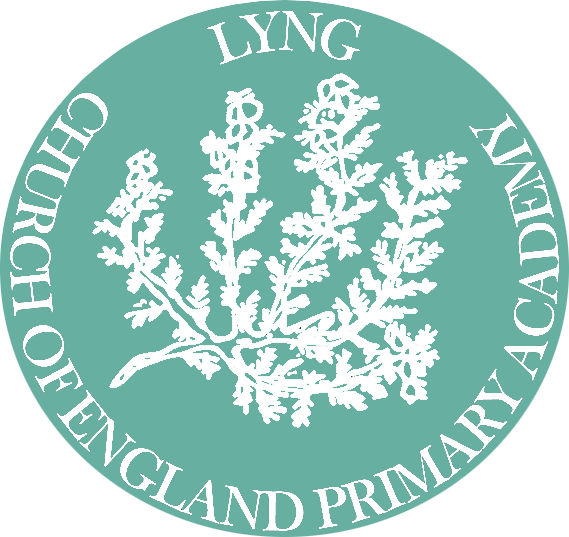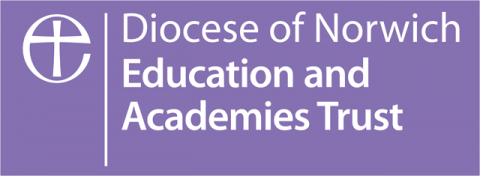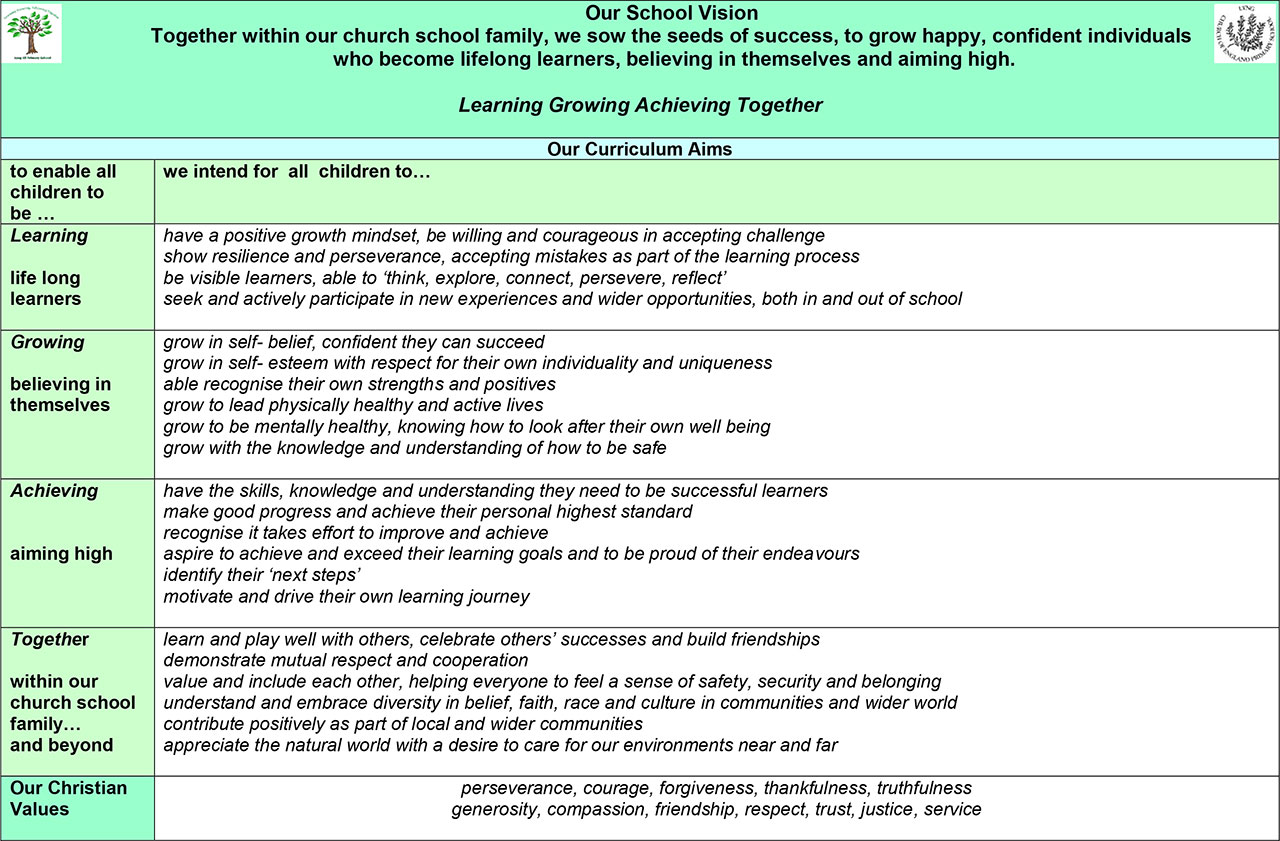OUR CURRICULUM
Our whole curriculum is made up of four core aspects, Learning, Growing, Achieving, Together.
Learning
The core of what we want to develop is a focus on children learning to be good learners who develop the skills to become lifelong learners. This is not about the content of a subject, but about understanding what qualities make a good learner.
To support this, we develop children’s ‘Growth Mindset’; encouraging children to be willing to try new things, to recognise mistakes as part of learning, and to persevere.
We have developed our own language for learning- this is to ‘think, explore, connect, persevere, reflect’. These qualities are displayed in every classroom and in the hall. Praise and recognition in lessons is often linked to these learning qualities, not just 'being the best'.
Growing
The core of what we want to develop is children’s personal development. Through our PSHE/ RSE / curriculum, and other areas and experiences including PE, 5 Ways to Well Being ,Yoga, Outdoor Learning, and Safety we develop children’s self- belief and respect for self, and their understanding of how to be mentally and physically healthy.
Achieving
The core of this curriculum learning. This is the content of the Early Years Foundation Stage Curriculum (In Reception year) and National Curriculum requirements published by the DFE. This is where we work to develop children’s core literacy and mathematical skills to the required standards and beyond, as well as to encourage children to develop knowledge and skills in order to achieve well in other areas, such as music, sports, and languages. We work to ensure children make good progress in their learning across the range of subjects.
Our curriculum extends beyond the core of the National Curriculum. Our curriculum is enriched by a range of opportunities, such as Forest School in reception and KS1, all children learning a musical instrument and visits to places of worship for example.
Together
The core of this is to teach children the value of being part of a community, be it a school community, a faith community or the global community. This is where we develop children’s understanding of the part they can play in ensuring we can live in a caring and safe community, with mutual respect and tolerance.
Much of this learning comes through our focus on 12 core Christian values, which are relevant to all. We place emphasis on ensuring children value and celebrate their own and others’ uniqueness as an individual. We do this through our PSHE programme, as well as wider opportunities across the curriculum. In addition to class work, we have a range of whole school activities to promote children’s interaction and contributions.
EYFS
The Early Years Foundation Stage (EYFS) underpins the curriculum in our Reception classes, and is distinct in its identity. The curriculum, by which we mean the learning and development undertaken by every child in this Key Stage, is planned in accordance with ‘Statutory Framework for Early Years Foundation Stage- September 2021’.
The overarching themes we follow each year are to complement children’s interests and to provide a context for their learning. The themes are explored across the learning areas identified within the framework.
The half- termly themes we have for this year are
- Autumn Term: Superhero Me, People who help us,
- Spring Term: Traditional Tales, Exciting Eggs,
- Summer Term: Around the World, Minibeasts
The development of each child is recorded through ongoing assessment.
On entry to Reception at our school, all children will undertake a 'baseline assessment' in order to understand each child’s stage of development, strengths and needs. Many children have followed an EYFS programme at nursery and the records made by practitioners in that setting also provide vital information that helps us to get to know each child on entry.
To monitor progress, observations are made of each child in a variety of environments and learning situations ensure that an accurate recording is made of their learning.
At our school, we use Tapestry, an online Learning Journal, as a tool to track ongoing progress against all the areas of learning, and to share achievements with parents. Parents have a log in and are asked to contribute achievements from home.
With a comprehensive view of the level of development for each child, and careful and flexible planning between all the staff in contact with the children, an appropriate, varied curriculum can be delivered to ensure the differing needs of the children can be met effectively.
KEY STAGE 1: YEARS 1 AND 2
Key Stage 1 of the National Curriculum (September 2014) begins formally in Year 1. Class teachers are responsible for planning and teaching coverage the whole curriculum (and the Norfolk Syllabus for RE) and adapt the long term plan based on the knowledge children need to learn in subjects, to deliver it in a well sequenced order. Subjects are tied in to these themes where appropriate to make the learning as relevant an exciting as possible. Discrete subject teaching will still happen when appropriate.
KEY STAGE 2: YEARS 3 TO 6
The National Curriculum (September 2014) underpins our statutory duty and is taught through key stage two as well as the Norfolk Syllabus for RE. The broad curriculum continues to be delivered through theme based approach, just as in key stage 1. The long term plans in this key stage are also based on the knowledge children need to learn in subjects, in a well sequenced order, but in key stage two the two mixed age classes (year 3 & 4 and year 5 & 6).
They study separate topics to ensure full coverage, each on their own two year rolling programme.
Introductory French and Spanish is taught on alternate years in Year 3and 4
French taught as the main foreign Language in Year 5 and 6, to ensure readiness for their high school transition.
PSHE AND RSE
Throughout the School PSHE (Personal, Social and Health Education) and Citizenship is an integral part of the curriculum. It is not solely taught in isolation and is the responsibility of all staff who come into contact with the children. For our PSHE curriculum, we use the Jigsaw programme.
We chose this scheme for our school because it is a Mindful Approach, which teaches children emotional literacy, social, and lifelong skills, and resilience in an age appropriate manner. The scheme covers areas such as Health, Well Being, and Celebrating Difference. Jigsaw is a whole school approach, which includes a half -termly focus along with launch assemblies.
For 'RSE (Relationships and Sex Education) the Jigsaw scheme covers all the curriculum requirements for this area of learning. It consists of lessons from Reception to Y6, sequentially building up age appropriate content as children learn and develop. RSE is a statutory element of the curriculum.
We hold a meeting for parents annually to share information about the RSE element of the programme before it is taught, so that they are fully aware of what their child’s learning will be in this area of the curriculum.
PHONICS and READING
From September 2022, we are using 'Success for All Phonics', a systematic synthetic phonics (SSP) programme validated by the DfE. This is based on the progression of 'Letters and Sounds'
Success for All Phonics will be taught from Reception through Year 1 and into Year 2. The programme consists of specific phonics lessons, supported by shared reading lessons within class.
All teachers are expert in the teaching of phonics, through their own professional experience and specific training with the programme.
'Success for All' is a complete, well sequenced teaching resource. There are 68 reading books to accompany the teaching of reading through Reception and Year 1. As a school, we have 30 copies of every book so each child can have the book to match the stage of teaching. Parents have access to books as e-readers too. Teachers and Teaching Assistants are all trained in the programme and its delivery. The scheme has a thorough half termly assessment to tack progress and ensure that we can target support to any children who need extra help to keep up.
With regard to reading, we primarily use 'Success for All' reading books, but we also have ‘Bug Club’ to supplement as a scheme for the children to follow.
We have recently reviewed and increased our selection of these phonetically decodable books, which are now carefully selected to match the progression of the 'Success for All' programme.
Children are given decodable books to read alongside the teaching of phonics and scheme specific books.
Children also choose books, which may be fiction or non-fiction from the library to supplement their reading scheme books. These books are to share together with parents/carers at home that the children will really enjoy but may need support to access the text.
For children who take a little longer to grasp the basics, we have trained Teaching Assistants who can support individuals or groups, out of the main classroom. Our priority is to support all children to 'keep up' with learning through individual support. Additionally, we may use widely recognised intervention programmes such as ‘Sound Discovery’ , ‘Catch-Up’ or ‘Lightening Squad’ tutoring programmes for those needing longer term support.
The early reading scheme is followed until children progress to being ‘Accelerated Readers’ in Key Stage 2- choosing their own reading books from the class library area. This is currently in Year 3, and will be extended to upper year groups as the programme is implemented.
When a child is an Accelerated Reader, they have a termly online adaptive assessment that gives them a clear steer on what books they should choose. When children have read a book, they then take a short comprehension quiz to ensure they did read it and could understand it.


